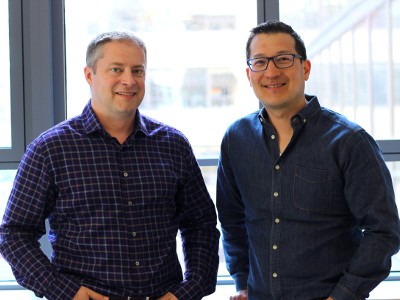

OMERS Ventures presented five privately held Canadian companies from its portfolio at the Cantech Investment Conference recently, any one of whom would have made a satisfying panel on their own, but when combined go a considerable distance to explaining why OMERS CEO John Ruffolo was named “Most Powerful Business Person” by Canadian Business last year.
Appearing on stage along with OMERS Managing Director Kent Thexton were five examples of OMERS Ventures’ investment acumen: Allen Lau of Wattpad, James Lochrie of WAVE Accounting, Andrew Reid of Vision Critical, Jeff Booth of BuildDirect, and LP Maurice of Busbud.
Investing in companies whose initial business models seemed disruptive enough that they would either transform their respective verticals or quickly be forgotten required a foresight best summed up by BuildDirect’s Jeff Booth, who said, “Being early and being wrong looks exactly the same.”
In Booth’s case, seeming either crazy or visionary to the outside world meant proving the company’s value proposition the hard way. “We were early, and the only way to get through is to test a million things,” he said.
Likewise, investing in a company that’s far enough ahead of the curve presents similar odds of either being wrong or perhaps a little too early for OMERS.
Using Lau’s experience with Wattpad as an example, Thexton outlined how Canada’s multi-lingual and multi-cultural nature is a feature, not a bug, which gives entrepreneurs a natural advantage internationally.
Confirming that, Lau said, “We have 100 employees, and every single one is based in Toronto. Because Toronto is such a multi-cultural city, it gives us a very unfair advantage. Our product is so global. We understand cultural and language nuances, and that really helped us become a global phenomenon.”
Thexton then mentioned that Wattpad is adding a new user to the company’s platform each second, at their current rate of growth, a statistic corroborated by Lau.
“We have close to 40 million monthly users,” he said. “They spend nearly 10 billion minutes on Wattpad every single month. As Kent mentioned, we are signing up 100,000 new users every day. That’s more than one user every second. So it’s growing really fast.”
Wattpad to date has risen over $70 million in funding over three rounds, including the most recent $46 million round, led by OMERS Ventures.
As a result of having fostered an enormous and dynamic community over time, no other platform for user-generated content has a clearer understanding of what readers actually want than Wattpad.
Competing with the likes of CandyCrush and online gaming, Wattpad’s insight has been to keep content bite-size by adopting a serialized model, publishing fiction chapter by chapter. Anyone who believes such a model is some kind of capitulation to our new low-attention-span way of life needs to be reminded that Charles Dickens published his stuff in exactly the same way.
WAVE Accounting, which focuses on accounting services for the micro- and small-business market, spent a significant amount of time in its early development convincing customers to allow a relatively unknown cloud-based purveyor of a SaaS solution to manage their money.
Not an easy sell.
“One of the key ingredients that has to be there is at least a thought pattern around trust,” said James Lochrie, WAVE’s co-founder and Chief Product Officer.
“We’re not at the stage of customer acquisition that Allen and Wattpad are at,” Lochrie said, “but we acquire a new customer about every 45 seconds, so we’re not doing too badly in the small business space.”
It didn’t happen overnight, but obviously the growth of the company has followed a similar trajectory to that of his fellow panelists, helped along by timely investments from OMERS, which helped them to scale internationally.
“Now when we’re talked about,” said Lochrie, “we’re talked about in the same conversations as you would hear about Intuit or Sage or Zero, multi-billion dollar public companies. We’re in the same lineup as them, simply because we built that brand and built that trust, and we’re accepted in the industry because of that.”
“Being early and being wrong looks exactly the same.” – BuildDirect CEO Jeff Booth
Vision Critical has stepped out from the shadow of traditional “market research” (which Andrew Reid’s father Angus developed in Canada during the 20th century) and created essentially a new category, which Andrew refers to as “insight communities”.
In 2006, Vision Critical raised $5 million. In 2009, it raised $50 million. In 2012, they took a $20 million investment from OMERS, which helped shift the company definitively towards being a technology focused pioneer in the market research space.
Moving away from the typical trajectory of legacy market research companies, Andrew saw the logic early of ploughing the money back into perfecting the company’s methodology, using revenue from the company’s growth to fund R&D.
“If I look at most of my colleagues in the tech space, they are giving away services while they try and grow. We actually did the opposite. So we were very opportunistic about using that, and then we used the power of a lot of professional consultants who had relationships to get large anchor deals. It’s easier to go into places like the GAP, Banana Republic and big auto manufacturers when you’ve got pros on the services side.”
BuildDirect began in 1999 in Vancouver to solve some of the pain points involved in home renovation, realizing, in Jeff Booth’s words that, “We can’t just ladder a new website on top of that channel, because it’s the channel that causes the pain. We have to build an entirely new end-to-end solution that looks at things completely differently.”
The company has seen explosive growth over the years, with two funding rounds led by OMERS Ventures during 2014, the first in January for $30 million and the second in December for $50 million, which the company used to expand BuildDirect’s technological advantage over competitors in the building supply space.
“It’s been a really exciting ride, and completely game-changing. It’s similar to what iTunes did to music. And a byproduct of that, we won’t shop in stores the same way we have shopped in stores.”
And if Busbud has its way, we’ll also never again travel by bus the way we’ve gotten used to.
The Montreal-based online marketplace focused on inter-city bus travel faced the same chicken-and-egg problem experienced by BuildDirect and Wattpad in the development of a frictionless solution for what had been a very fragmented and difficult bus industry.
“It’s been an interesting process, building out the platform,” said founder and CEO LP Maurice, “because we needed to build both the supply piece and the demand piece. There was no readymade API for this market. That’s been the key factor for us, building the supply and the demand kind of in lockstep, but at the same time realizing that we really need to do that in a data-driven way all the time.”
Major bus companies like Greyhound have since adopted Busbud’s platform, which they regard as a channel they’ve never had access to before. Busbud, again capitalizing on the natural internationalism inherent in being Canadian that has also benefited its fellow panelists, set out to solve the problem of buying bus tickets in foreign countries across a variety of broken websites and untranslated foreign languages.
“Currently, we’re covering about 10,000 cities in 100 countries, and we’re really ramping up in terms of the supply network, about 1,500 partners that are revenue-generating for Busbud. The idea is really to become an Expedia for buses, and to let people travel the world and book bus tickets more easily than they’ve ever been able to do before.”
“Because Toronto is such a multi-cultural city, it gives us a very unfair advantage. Our product is so global. We understand cultural and language nuances, and that really helped us become a global phenomenon.” – Wattpad CEO Allen Lau
Using a data-driven approach to cement a platform capable of servicing international markets best won over through mobile engagement can describe all five of the panelists on the OMERS panel.
While they actually service very different verticals, their goals and their background share more similarities than differences.
It’s these similarities that OMERS Ventures was canny enough to spot and encourage through timely investment. And its this type of investment that will allow this and the next generation of Canadian tech entrepreneurs to scale internationally.
At the 2014 Cantech Investment Conference, on the same stage, OMERS CEO John Ruffolo talked about investing in privately held companies while hinting at potential IPOs to come.
Thexton spoke about OMERS’ methodology so far, which other major investment firms and VC funds have tried to replicate with nowhere near the success rate.
“What we look at at OMERS is we try to find markets that have an opportunity to support significant companies. We try to find companies that can then have a product that’s going to be effective in that market.”
Whether the companies in the OMERS portfolio remain privately held or seek to tap the public markets through an IPO, the emphasis remains on building healthy Canadian tech companies who will eventually replace the losses felt by the exits and failures of companies like Nortel and RIM.
“As you can see, the business models here are quite different markets,” said Thexton, “but one of the common elements I would draw out as you’re listening is, these are all incredibly innovative, driven, fantastic leaders that are out, making things happen.”
Leave a Reply
You must be logged in to post a comment.






 Share
Share Tweet
Tweet Share
Share




Comment